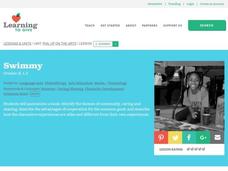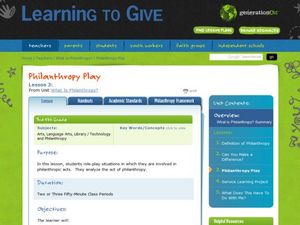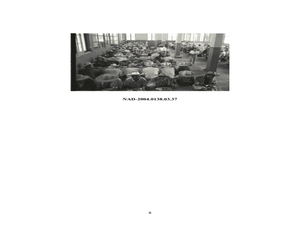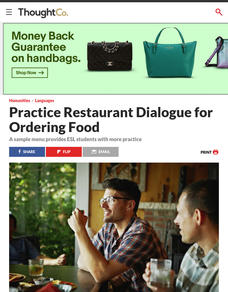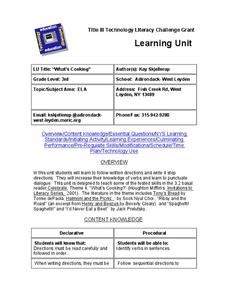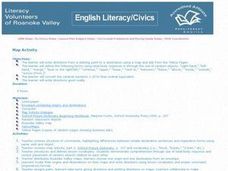Curated OER
Swimmy
Students explore the themes of the book Swimmy by Leo Lionni. In this literacy lesson, students dramatize a character from Swimmy and identify common themes such as cooperation and caring. Students create a new ending to the story.
Curated OER
Philanthropy Play
Students explore the concept of philanthropy. For this service learning lesson, students simulate and role play people involved in the act of helping others.
Curated OER
Democracy in Action: Everyday Farmers
Students experiment with a situation as if they were farmers in a co-op. In this democratic decision making lesson, students role-play as farmers that are members of a co-op and a have a serious decision to make about spreading their...
Curated OER
Learning from Photos
Students use photographs to study the Bracero Labor Program. In this analyzing photographs lesson, students are broken up into groups and given a photograph of Bracero laborers. They predict the answers to questions about the photo...
National Endowment for the Humanities
Responding to Emily Dickinson: Poetic Analysis
Learners explore Emily Dickinson's poem "Safe in Their Alabaster Chambers." In this Dickinson poem lesson, students analyze the poem as proof of Dickinson' awareness of her reader. Learners analyze her style and identify her editorial...
Curated OER
Interpreting Political Cartoons in the History Classroom
Students analyze political cartoons. In this historical perspectives lesson, students use the provided cartoon analysis worksheet to examine the political cartoons that their instructor shares with them.
Curated OER
The Solar System
Third graders investigate Newton's law of Motion. In this chemical reaction lesson, 3rd graders participate in an experiment with rockets to study Newton's law. Students observe the effects of a chemical reaction made by combining...
Curated OER
Narrative Writing--The Hobbit
Hobbits, dwarfs, wizards, trolls, and goblins. Readers track these fantastic creatures through J.R.R. Tolkien’s The Hobbit noting passages of character description and habitats. Using specific passages from the novel, class...
Curated OER
Lecture 6 - Oral Interpretation - Verse
Students discuss how oral interpretation varies with prose and poetry. They select a piece of prose or poetry to present to the class, and then assess each other on the organization and delivery of their speech as well as on their...
Curated OER
Quotation Marks
Seeing multiple quotation mark mishaps in your class? Show them how to use quotation marks properly with this handout. While this is not an interactive worksheet, it could act as a reference sheet for writers as they compose and edit...
Curated OER
Making a Doctor's Appointment Over the Phone
Students listen to a sample phone call making an appointment for a doctor's office. They complete a worksheet in which they fill in the missing words. They role-play a telephone conversation between a patient and a receptionist.
Curated OER
Speaking and Listening Lesson Based on Ordering Food in a Restaurant
Learners practice the skill of ordering food in a restaurant. After a lecture/demo, students work in pairs. Utilizing a worksheet imbedded in this plan, they gain practice in the skill of ordering food from a menu.
Curated OER
What's Cooking
Third graders practice following and writing directions through the use of simple recipes. First they write directions for creating an ice cream sundae. Then they make the sundaes using the recipe written by their classmates.
Curated OER
Idioms
Students study the meanings of idioms containing the phrase "up" or "down." In this language lesson, students are given an online scenario where the idiom phrases are used. Students answer multiple choice questions about their meaning.
Curated OER
Map Activity - Roanoke Valley
Students write directions from a starting point to a destination using a map and ads from the Yellow Pages. They define the following terms using total body response or through the use of random objects: "right-hand," "left-hand,"...
Curated OER
Literacy Map Activity
Students write directions using maps and ad, they define driving directions and convert cardinal numbers to there ordinals. They write directions which are given orally in these multi-level literacy activities.
Curated OER
What Really Happened?
Sixth graders recreate scenes from the theories about the disappearance of Amelia Earhart. In this history and theatre activity, 6th graders review the story of Earhart using a flip chart. Students work on one act plays to depict one of...
Curated OER
Raising Students Awareness of Intonation at Discourse Level
Students develop their listening strategies, by raising their awareness of intonation at discourse level, particularly pitch level.
Curated OER
The Artist As Entrepreneur: You Say Tomato, I See Tomato
Young scholars compare phone negotiations with in person negotiations to identify the non-verbal communication that is produced in face-to-face meetings. They practice forms of non-verbal communication by reciting the alphabet and...
Curated OER
The Flatmates Episodes 76 & 77: Writing an Advert
Students analyze and write their own advertisements. In this media lesson plan, students study vocabulary and make predictions as they complete worksheets and activities based on advertising.
Curated OER
Peer Pressure Response
Students come up with different ways to respond to their peers asking them to drink alcohol or to try or do drugs. They write what they would do (if it were them) in that type of situation and list all the possibilities they can think of.
Curated OER
Morphing
Pupils examine how organisms adapt to their environment in order to survive. As a class, they discuss the extinction of the dinosaurs and review Darwin's theory of survival of the fittest. They select an animal to morph in the future and...
Curated OER
A Pilgrim Conversation
Students place quotation marks in the correct place in a conversation. They review correct placement with students copying down sentences from the board. They write their own conversation between two pilgrims to complete the lesson.
Curated OER
Argument in an Athenian Jail: Socrates and the Law
High schoolers consider how Socrates might have responded to extenuating circumstances: for example, if his sentence had been imposed by a tyrant rather than in a trial, or if it had been influenced by prejudice.
